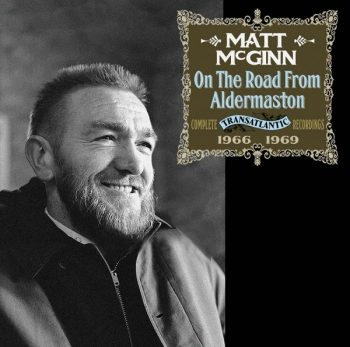 (3 / 5)
(3 / 5)
Although he died forty years ago, at the age of 48, Matt McGinn left behind a legacy of more than 500 songs that he had written. Labelled “Scotland’s Woody Guthrie” by US folk legend Tom Paxton, Matt was one of the key figures of the folk revival in Scotland. A prodigiously talented singer/songwriter who moved effortlessly between ribald humour, topical novelties, good-natured parodies, children’s verse, tender love songs and heavily politicised protest material.
His talents were commemorated in 2004 with a concert that was staged in New York on Broadway, where folk icon Pete Seeger suggested that “…if there’s a human race here in hundreds of years, people alive then will still be singing his songs”.
This double-CD anthology, which gives us 26 tracks on disc one and 30 tracks on disc two; 56 songs in total, focuses on the four-year period in the late 1960s when he was signed to leading folk label Transatlantic, for whom he recorded a quartet of albums that contain many of his best-loved and most enduring songs. The albums were the 1966 release, “Matt McGinn”, “Matt McGinn Again”, which came out in 1967, “Honesty Is Out Of The Fashion”, from 1968 and his final record for the label, the 1969 release, “Little Ticks Of Time”.
Songs including “Coorie Doon” and “Three Nights And A Sunday”, both of which are included alongside the likes of Woody Guthrie, Lead Belly and Bob Dylan in the Smithsonian’s Top One Hundred Folk Songs of the 20th Century. The collection includes the singles, “The Boys From Lisbon”, from ’67 and the single and B side, “The Rolling Hills Of The Border” and “Moaning” from 1968.
This two-CD set, offers Matt McGinn’s entire output for Transatlantic Records for the first time, and the material is taken from the original master tapes. Many of the tracks have never been released on CD before. McGinn’s songs have been recorded, amongt others, by Pete Seeger, The Weavers, Theodore Bikel, The Corries, Luke Kelly, The Ian Campbell Folk Group, Barry Dransfield & Rachel Unthank and the Winterset.
He was the eighth of nine children, and his formal education ended at 12 when he was sent to an approved school. McGinn’s first novel about his time in approved school, “Fry the Little Fishes”, was first published in 1975, the second edition re-issued in 2013. On his release from approved schoo,l he worked in the GKN factory, spending his spare time at evening classes and reading. He gained a Trade Union scholarship to study economics and political science at Ruskin College in Oxford when he was 31. After graduating, he trained to become a teacher and went on to work as a teacher in Lanarkshire for three years, before becoming the organiser of the Gorbals Adventure Playground.
McGinn joined the folk scene after winning a song contest. He met Pete Seeger in 1961 when Seeger was touring the British Isles. Seeger championed McGinn’s music in the United States and arranged for McGinn to be part of a concert performance at Carnegie Hall, where McGinn met a young Bob Dylan.
McGinn’s earliest recording was in 1962, when he was featured on the Folkways Records “Revival in Britain, Vol. 1” a collection compiled by Ewan MacColl. He was also featured, alongside Bob Dylan and Pete Seeger, on the ″Broadside Ballads Vol. 1″, released in 1963. McGinn was also included in the 2000 compilation ″The Best of Broadside 1962–1988″, which was nominated for a “Grammy” in the “Best Historical Album” category in 2001.
He recorded in his own right for the first time, on the 1966 self-titled album on Transatlantic. He recorded for several labels during his career, and his final album came out in 1975 on the Pye label, “Ma Wee Sarah & Granda”, one of two Pye releases of McGinn’s work that year. He died in 1977, of smoke inhalation, after falling asleep with a lit cigarette in his hand. The post mortem revealed there was no trace of alcohol in his blood.
By Christopher Weston
 (1 / 5) ‘Dull Zone’
(1 / 5) ‘Dull Zone’ (2 / 5) ‘OK Zone’
(2 / 5) ‘OK Zone’ (3 / 5) ‘Decent Zone’
(3 / 5) ‘Decent Zone’ (4 / 5) ‘Super Zone’
(4 / 5) ‘Super Zone’ (5 / 5) ‘Awesome Zone’
(5 / 5) ‘Awesome Zone’

















Recent Comments